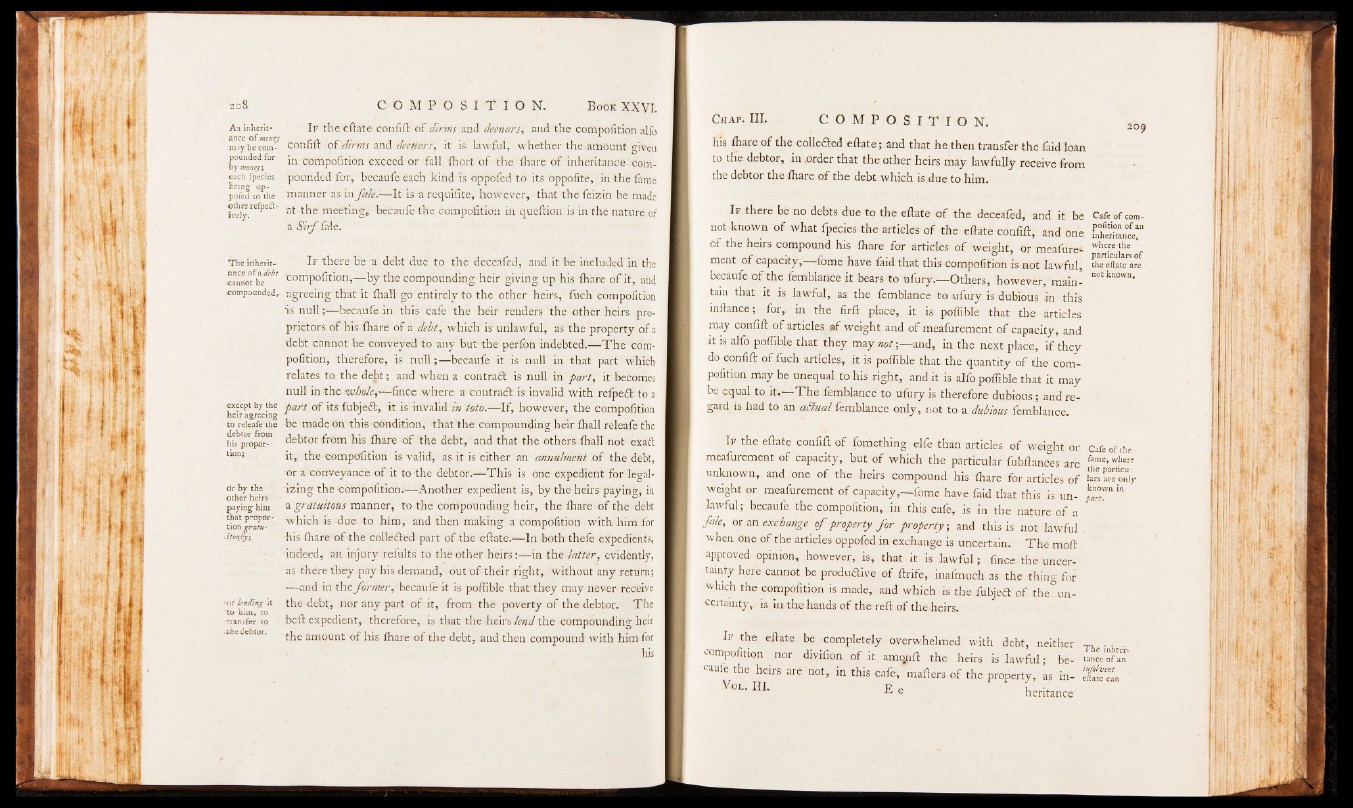
An inheritance
of money
may be compounded
for
by moneyj
each fpecies
being oppofed
to the
other refpecl-
ively.
The inheritance
o f a debt
cannot be
•compounded,
•except by the
heir agreeing
to releafe the
debtor from
his proportion;
dr by the
other heirs
paying him
that proportion
grata-
.itmjfy;
-or lending it
to him, to
transfer to
stht debtor.
If the eftate confift of dirms and deenars, and the compofition alfo
confift o f dirms and deenars, it is lawful, whether the.amount given
in compofition exceed or fall fhort of the lhare of inheritance compounded
for, becaufe each kind is oppofed to its oppofite, in the fame
manner as in fale.— It is a requifite, however, that the feizin be made
at the meeting, becaufe the compofition in queftion is in the nature of
a S ir f fale.
I f there be a debt due to the deceafed, and it be included in the
compofition,— by the compounding heir giving up his fhare of it, and
agreeing that it (hall go entirely to the other heirs, fuch compofition
is n u l lb e c a u f e in this ‘ cafe the heir renders the other heirs proprietors
of his fhare of a debt, which is unlawful, as the property of a
debt cannot be conveyed to any but the perfbn indebted.— T h e compofition,
therefore, is null;— becaufe it is null in that part which
relates to the de£t; and when a contra£t is null in part, it becomes ■
null in the whole,— fince where a contrail: is invalid with reffied to a
part of its fubjed, it is invalid in tola.— If, however, the compofition
be made on this‘condition, that the compounding heir (hall releafe the
debtor from his (hare of the debt,, and that the others lhall not exad
it, the competition is valid, as it is either an annulment of the debt,
or a conveyance of it to the debtor.— This is one expedient for legalizing
the compofition.— Another expedient is, by the heirs paying, in
a gratuitous manner, to the compounding heir, the (hare of the debt
which is due to him, 'and then making a compofition with him for
his (hare of the colleded part of the eftate.— In both thefe expedients,
indeed, an injury refults to the other heirs:— in the. latter, evidently,
as there they pay his.demand, out of their right, without any return;
— and in the former, becaufe it is poffible that they may never receive
the debt, nor any part o f it, from the poverty of the debtor. The
bed expedient, therefore, is that the heirs lend the compounding heir
the amount of his (hare of the debt, and then compound with him for
bis
Chap. III. C O M P O S I T I O N .
his (hare of the colleded eftate; and that he then transfer the faid loan
to the debtor, in .order that the other heirs may lawfully receive from
the debtor the (hare of the debt which is due to him.
If there be no debts due to the eftate o f the deceafed, and it be
not known of what fpecies the articles of the eftate confift, and one
of the heirs compound his (hare for articles of weight, or meafure*-
ment of capacity,—fome have faid that this compofition is not lawful,
becaufe of the femblance it bears to ufury.—Others, however, maintain
that it is lawful, as the femblance to ufury is dubious in this
inftance; for, in the firft place, it is poffible that the articles
may confift of articles i»f weight and of meafurement of capacity, and
it is alfo poffible that they may not;— and, in the next place, if they
do confift of fuch articles, it is poffible that the quantity of the compofition
may be unequal to his right, and it is alfo poffible that it may
be equal to it.—The femblance to ufury is therefore dubious; and regard
is had to an adtual (emblance only, not to a dubious femblance.
If the eftate confift of fomething elfe than articles of weight or
meafurement of capacity, but of which the particular fubftances are
unknown, and one of the heirs compound his (hare for articles of
weight or meafurement of capacity,—fome have faid that this is unlawful;
becaufe the compofition, in this cafe, is in the nature of a
fd e , or an exchange o f property fo r property; and this is not lawful
when One of the articles oppofed in exchange is uncertain. The mod
approved opinion, however, is, that it is lawful; fince the uncertainty
here cannot be produdive of ftrife, inafmuch as the ‘thing for
which the compofition is made, and which is the fubjed of ^ u n certainty,
is in the hands of the reft of the heirs.
If the eftate be completely overwhelmed with debt, neither
compofition nor divifion of it amqnft the heirs is lawful; becaufe
the heirs are not, in this cafe, mafters of the property, as in-
VoL. Ill, E ce tn, en•t.ance
Cafe of compofition
of an
inheritance,
where the
particulars of
the eftate are
not known.
Cafe of. the
fame, where
the particulars
are o n l f
known in
part.
The inherit
tance of an
injblvent
eftate can